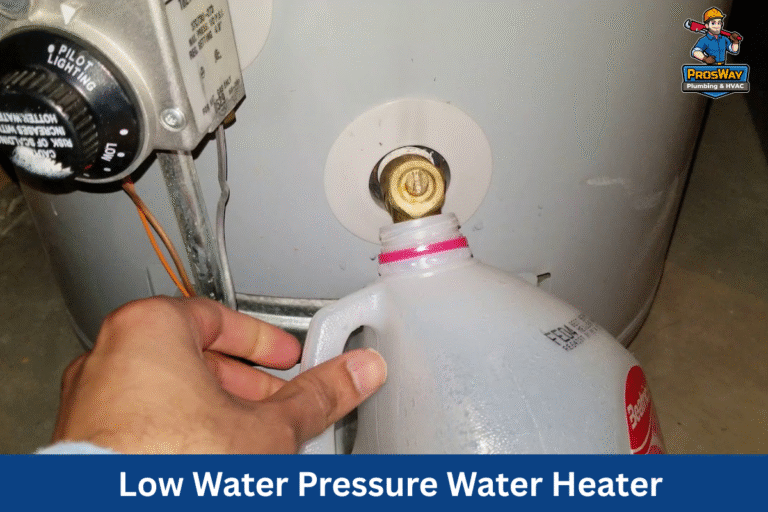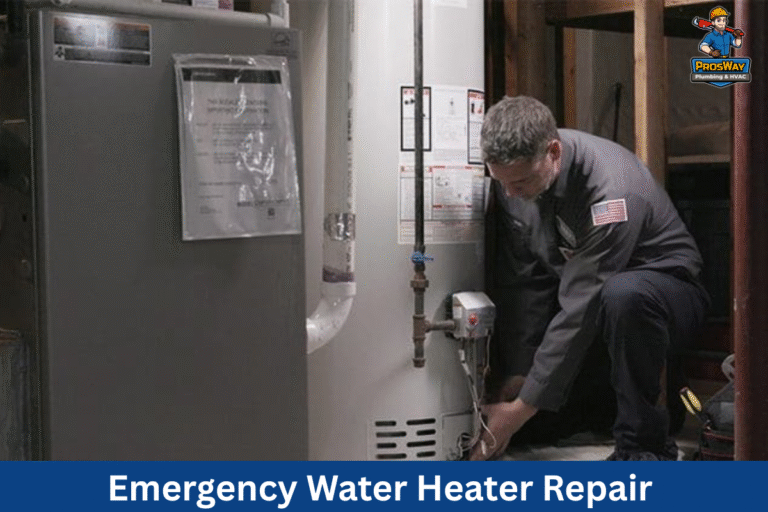Tree roots growing inside sewer lines are one of the most common plumbing problems homeowners face. If you’ve noticed slow drains, gurgling toilets, or foul odors, roots may already be invading your pipes.
Here comes the question: Does root killer really dissolve roots? The answer is that root killer can work, but it depends on the condition of your pipes and how far the roots have grown. At ProsWay Plumbing & HVAC, we get this question often from Northern New Jersey homeowners. We’ve dealt with root-invaded sewer lines in towns. Our experts know which products and treatments actually help—and which don’t.
This guide outlines how root killer works, when to use it, and what to expect, alternatives that may be faster or more effective, depending on the severity of the root problem.
What Causes Roots to Invade Sewer Lines?
Roots enter sewer pipes because they’re searching for water, nutrients, and oxygen. Older or damaged pipes give roots an easy way in.
Most sewer lines run underground where tree roots grow freely. Even a small crack or loose joint allows roots to slip inside. Once they find moisture, they grow fast, sometimes forming thick mats that block the entire pipe.
According to the American Society of Civil Engineers, tree roots are responsible for about 50% of all sewer blockages in the United States. That includes New Jersey, where older homes often have clay or cast-iron pipes. These materials are more prone to cracking, especially if the ground shifts from freeze-thaw cycles.
Signs you may have root intrusion include:
- Frequent drain backups
- Toilet gurgling or bubbling
- Strong sewage odor in the yard or basement
- Wet patches on your lawn above the sewer line
Terms to know:
- Root intrusion: When roots enter and grow inside a pipe
- Sewer lateral: The pipe connecting your home to the main city sewer
- Tree root blockage: Partial or full clog caused by root growth
What Is Root Killer? How Does It Work?
Root killer is a chemical product that targets and kills roots inside sewer pipes. It does not harm the entire tree. Instead, it destroys the small root fibers growing within the pipe walls. This prevents further growth and helps restore normal water flow.
There are several types of root killers available:
Types of Root Killers
| Type | Main Ingredient | How It Works | Pipe Safety |
| Copper Sulfate | Copper sulfate crystals | Dries out root tips by cutting off moisture | Safe with limited use |
| Foaming Root Killer | Dichlobenil + surfactants | Fills pipe, coats root surfaces, and stops new growth | Safe for most systems |
| Herbicidal Root Killer | Metam sodium | Acts as a pesticide, penetrating fine root structures | Depends on dosage |
The best root killer for sewer lines depends on the situation. For preventive use, a foaming root killer is often safer and more effective. It clings to pipe walls and treats a larger surface area.
The Environmental Protection Agency (EPA) approves several root killer products for in-pipe use. However, improper application can damage pipes or affect nearby plants. Therefore, always follow label instructions or consult a licensed plumber.
At ProsWay Plumbing & HVAC, we recommend the best drain root killer after inspecting the pipe conditions. What works for one home may not work for another. That’s why accurate diagnosis matters.
Does Root Killer Dissolve Roots or Just Kill Them?
What dissolves tree roots in sewer lines fast? The short answer: No chemical root killer dissolves roots instantly. Most products kill roots first. After the roots die, they gradually break down and wash away with normal water flow.
A 2021 study by the Water Research Foundation confirmed this process. Chemical root killers begin working within 24–48 hours, but full root breakdown may take weeks, especially in older or partially blocked pipes.
So, does root killer work in pipes? Yes, it works—but with conditions:
- The roots must be small enough for the chemical to reach.
- The pipe must allow good flow for the product to coat surfaces.
- You may need to mechanically remove large root clumps first.
If roots have completely blocked the pipe, root killer won’t reach the problem area. In that case, a mechanical auger or hydro jetting is required first. After clearing, you can apply the best sewer root killer to stop regrowth.
Think of root killer as part of a full treatment plan, not a magic fix. The best results come when used after an initial cleaning, followed by regular maintenance.
How Long Does It Take for Root Killer to Work?

Root killer does not act immediately. Most products need time to reach and affect the roots inside the sewer line.
For example:
- Copper sulfate takes about 3 to 7 days to dry out small root tips.
- Foaming root killer usually starts to work in 24 to 72 hours and takes up to 2 weeks for full effectiveness.
The rate of success depends on several factors:
- How dense the roots are
- How much flow does the pipe allow?
- The type of root killer used
According to data from the National Association of Sewer Service Companies (NASSCO), root killers are most effective when pipes are still open enough to allow product coverage. If a line is fully clogged, the root killer cannot pass through. In this case, plumbers use a rooter machine or hydro jetting to open the pipe first.
At ProsWay Plumbing & HVAC, we often apply root killer right after clearing the pipe. This prevents roots from regrowing and keeps the pipe open longer.
Homeowners should not expect overnight results. Chemical treatments take time. The goal is to kill and dry out the roots, not dissolve them on contact.
When Is Root Killer Effective — And When It’s Not
Root killer works best as a maintenance solution or for early-stage problems. It is not ideal for large blockages or broken pipes.
When Root Killer Works Well
- Minor root growth is detected early.
- The pipe is still open and flowing.
- It follows a mechanical cleaning.
- It is used regularly for prevention.
In these cases, the best tree root killer for sewer lines can extend the life of your pipes and reduce emergency backups.
When Root Killer Fails
- The pipe is completely blocked by thick roots.
- The line is collapsed or broken.
- The product is used incorrectly or in poor flow conditions.
No product, including the best sewer root killer, can fix a broken pipe. If the pipe is cracked or collapsed, trenchless sewer repair or replacement is required. That’s why proper diagnosis is important. At ProsWay Plumbing & HVAC, we use sewer camera inspections to confirm the root location and pipe condition before treatment.
Homeowners should avoid using chemicals repeatedly without solving the core issue. Long-term damage or recurring blockages may cost more in the future.
Alternative Solutions to Root Killers
Root killer can help in many cases. But it’s not always the best or fastest option. In some situations, you may need a different method to remove roots and restore flow.
1. Mechanical Auger (Rooter Machine)
This tool has a rotating blade that cuts through roots. It clears the pipe quickly. It’s often used first before applying a root killer for ongoing protection.
2. Hydro Jetting
Hydro jetting uses high-pressure water to blast roots and debris from the pipe walls. It cleans thoroughly and is safe for most pipe materials. Studies by the Plumbing-Heating-Cooling Contractors Association (PHCC) show that hydro jetting is effective for both roots and grease buildup.
3. Trenchless Pipe Lining (CIPP)
Cured-in-place pipe (CIPP) lining creates a new pipe inside the old one. It seals cracks and keeps roots out permanently. Trenchless repair is a long-term solution for pipes with repeated root problems.
4. Full Pipe Replacement
If the pipe is collapsed or too damaged, replacement may be the only option. This is often needed when the same section of pipe blocks repeatedly.
Do Root Killers Harm the Local Ecosystem?

Many homeowners ask if root killers are safe for the environment. The answer depends on the product and how it’s used.
Copper sulfate, a common ingredient in root killers, can harm plants and aquatic life if overused. Studies from the U.S. Geological Survey (USGS) show that copper can build up in soil and water, affecting nearby vegetation.
Some products may also disrupt beneficial bacteria in the soil or leach into groundwater if used too frequently or in large doses.
To reduce environmental impact:
- Choose foaming root killers with lower toxicity.
- Avoid applying during heavy rain.
- Follow all dosage instructions exactly.
What Local New Jersey Homeowners Should Know About Tree Root Problems
New Jersey’s clay-rich soil holds moisture, attracting tree roots to nearby sewer lines, especially in older neighborhoods with clay or cast iron pipes. High-risk trees in NJ include:
- Silver maple
- Willow
- American elm
- Sycamore
These species have aggressive root systems that often invade sewer laterals.
Local tips:
- Towns like Montclair and Clifton advise against planting trees within 10 feet of sewer lines.
- Some municipalities offer sewer inspections or planting guidelines—check with your local DPW.
Call a plumber if you notice:
- Gurgling drains
- Foul sewer odors
- Persistent slow drainage
- Soggy or sunken lawn spots
At ProsWay Plumbing & HVAC, we offer fast, non-invasive camera inspections across Northern New Jersey to detect and treat root problems early—before major damage happens.
Preventing Future Root Problems
Killing roots once isn’t enough. Roots regrow. Prevention is key. Here’s how to prevent root problems in sewer lines:
- Use root killer every 6–12 months as part of routine maintenance.
- Schedule annual sewer camera inspections, especially if your home is over 30 years old.
- Avoid planting large trees near sewer lines.
- Replace broken or cracked pipes with trenchless pipe lining if intrusion is frequent.
The best tree root killer for sewer lines will help, but it’s part of a larger prevention strategy. Combining chemical treatment with physical inspections keeps your system safe and working.
Does Root Killer Really Work?
Yes, root killer works—when used correctly and under the right conditions. It is most effective:
- As a preventative treatment
- After mechanical cleaning
- For early-stage root growth
It does not dissolve roots instantly, and it won’t help if the pipe is fully blocked or collapsed. Choosing the best root killer for sewer lines means knowing what type of product to use, when to apply it, and how to monitor results. That’s where a licensed plumber makes all the difference regarding tree roots and sewer lines.
Conclusion
Root killer can work—but it’s not a miracle solution. It helps kill and control roots inside sewer pipes, especially when used early and applied correctly. For full blockages or pipe damage, mechanical cleaning or pipe lining may be needed. The key is knowing when to use root killer, what type works best, and how to maintain your sewer lines over time.
Stop Roots Before They Wreck Your Pipes!
If you’re dealing with slow drains, sewer backups, or suspect root intrusion, don’t wait. ProsWay Plumbing & HVAC is your trusted local expert for diagnosing and solving root problems in sewer lines. We offer professional sewer camera inspections, rooter services, and eco-safe root killer treatments to protect your pipes without harming the environment. We serve homeowners across Northern New Jersey and respond quickly to plumbing emergencies. Call us now at (862) 260-5870 or Book Online today for a personalized quote!








